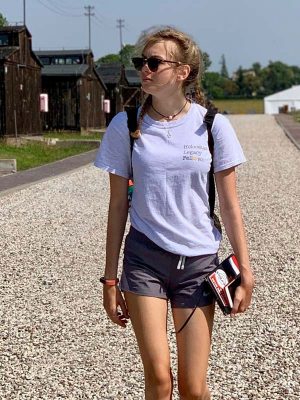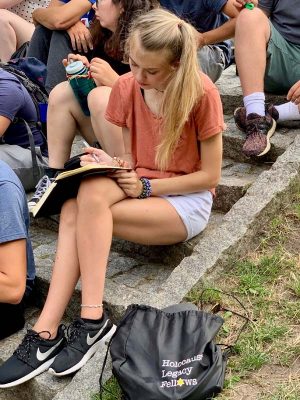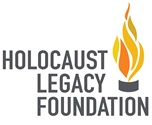Olivia Voznyuk
Swampscott, MA
Swampscott High School
 When I was just about ten years old, we briefly learned about the Holocaust in school. The only explanation I ever received was what the Holocaust was and who was involved. We were assigned a book to read at home, “The Boy in the Striped Pajamas.” Not knowing or understanding much, I came home and asked my dad to order the book for me. The next day, the book was waiting for me on my doorstep. It took me a while to open the box and unwrap the book. Once I did, my mind started to rush with questions. The first thing I saw was the cover. There was a boy around my age sitting in front of a barb-wire fence with a shaved head and sad eyes. He was wearing striped pajamas. Why? Why is his head shaved? Why are his eyes sad? Why was he so close to a barb-wire fence? I looked at my mom, and my mom looked at me. There was silence. She finally told me to go up to my room and read the book. I looked into the boys sad eyes one more time, then I opened it. At first, I thought that flipping through the pages was pointless. All I wanted was a simple answer to the question “why?” I was his age. I had my family. I had my comfortable bed. I had tons of clothes and shoes. I had food on my table. I had an iPhone 3. At the time, this was all that mattered to me and was my definition of a comfort zone. I was happy, but the thing that I could not let go of was why this little boy had such sad eyes. I kept telling myself that I would read the book tomorrow. I could not wait until tomorrow. When I found the answer, I was not upset, I was confused. When the son of an SS Officer invited the boy behind the fence for dinner, he was speechless because of the reason why the little boy said, “no.” The little boy’s friend thought the fence was to keep animals out, but in reality it was to keep the people in. Jews. The two of them sat in silence.
When I was just about ten years old, we briefly learned about the Holocaust in school. The only explanation I ever received was what the Holocaust was and who was involved. We were assigned a book to read at home, “The Boy in the Striped Pajamas.” Not knowing or understanding much, I came home and asked my dad to order the book for me. The next day, the book was waiting for me on my doorstep. It took me a while to open the box and unwrap the book. Once I did, my mind started to rush with questions. The first thing I saw was the cover. There was a boy around my age sitting in front of a barb-wire fence with a shaved head and sad eyes. He was wearing striped pajamas. Why? Why is his head shaved? Why are his eyes sad? Why was he so close to a barb-wire fence? I looked at my mom, and my mom looked at me. There was silence. She finally told me to go up to my room and read the book. I looked into the boys sad eyes one more time, then I opened it. At first, I thought that flipping through the pages was pointless. All I wanted was a simple answer to the question “why?” I was his age. I had my family. I had my comfortable bed. I had tons of clothes and shoes. I had food on my table. I had an iPhone 3. At the time, this was all that mattered to me and was my definition of a comfort zone. I was happy, but the thing that I could not let go of was why this little boy had such sad eyes. I kept telling myself that I would read the book tomorrow. I could not wait until tomorrow. When I found the answer, I was not upset, I was confused. When the son of an SS Officer invited the boy behind the fence for dinner, he was speechless because of the reason why the little boy said, “no.” The little boy’s friend thought the fence was to keep animals out, but in reality it was to keep the people in. Jews. The two of them sat in silence.
This was more than seven years ago. I thought I found an answer back then, but to this day I was still looking for one. The thought of being a Jew has never left me, until I received a letter in the mail addressed to me. At first, I thought it was a piece of junk mail out of the hundreds that we get every day. As soon as I saw the yellow Star of David on the front, I refused to toss it aside. Little did I know that this letter, an invitation to Germany and Poland, would change me as a person as well as my entire life. I found the answer that I have been searching for my whole life.
The Holocaust was and will always be a watershed event in Jewish history and in the history of humanity. The Holocaust was the mass genocide of the European Jews between 1933 and 1945. Across German-occupied Europe, Nazi Germany and its allies systematically murdered approximately six million Jews, about two-thirds of Europe’s Jewish population, and a total of eleven million innocent people. It is important to learn about the Holocaust because it highlights the dangerous aspects of human behavior that affect society, such as scapegoating and the potential for extreme violence with the abuse of power. It is an honor to be a Holocaust Legacy Fellow and to have the chance to visit Germany and Poland. Spending two days in Germany and seven days in Poland allowed me to understand the horrors that Nazi Germany committed.
 It is a common joke or misconception in history to debunk the Holocaust and the millions who were murdered. I can personally provide evidence to those who do not believe in the Holocaust. I walked through thousands of stones commemorating Jewish communities that have died in Treblinka. I entered Auschwitz-Birkenau and I could not stop imagining 100 Jews crammed in each cattle car, oblivious of their destination. I walked underneath the entry sign of Auschwitz, ‘Arbeit Macht Frei,’ the most infamous lie in history translating to ‘Work Sets You Free.’ I searched through a couple of pages out of thousands where the names of four million murdered Jews were recorded. I stood in front of a mass grave of 800 innocent children where so much meaning in life is shown, yet their lives have been taken away. I walked through the crematorium in Majdanek, staring in shock into the ovens where bodies were burned to ashes. I then stared into a pit of ashes of thousands of Jews where a rush of emotions kept hitting me. Everywhere I went, there was no doubt that the dirt or grass underneath me contained the remains of people and their ashes. You cannot tell me the Holocaust did not happen. You cannot tell me that Jews were just part of a casualty during World War II. My own two legs allowed me to walk through four death camps: Treblinka, Auschwitz I, Auschwitz-Birkenau (II), and Majdanek. Although these camps were all different in their own way, the systematic methods of killing were the same everywhere. These camps now serve as reminders of what can happen when humanity is completely lost, something that we, as Holocaust Legacy Fellows, cannot allow our current or future generations to reach.
It is a common joke or misconception in history to debunk the Holocaust and the millions who were murdered. I can personally provide evidence to those who do not believe in the Holocaust. I walked through thousands of stones commemorating Jewish communities that have died in Treblinka. I entered Auschwitz-Birkenau and I could not stop imagining 100 Jews crammed in each cattle car, oblivious of their destination. I walked underneath the entry sign of Auschwitz, ‘Arbeit Macht Frei,’ the most infamous lie in history translating to ‘Work Sets You Free.’ I searched through a couple of pages out of thousands where the names of four million murdered Jews were recorded. I stood in front of a mass grave of 800 innocent children where so much meaning in life is shown, yet their lives have been taken away. I walked through the crematorium in Majdanek, staring in shock into the ovens where bodies were burned to ashes. I then stared into a pit of ashes of thousands of Jews where a rush of emotions kept hitting me. Everywhere I went, there was no doubt that the dirt or grass underneath me contained the remains of people and their ashes. You cannot tell me the Holocaust did not happen. You cannot tell me that Jews were just part of a casualty during World War II. My own two legs allowed me to walk through four death camps: Treblinka, Auschwitz I, Auschwitz-Birkenau (II), and Majdanek. Although these camps were all different in their own way, the systematic methods of killing were the same everywhere. These camps now serve as reminders of what can happen when humanity is completely lost, something that we, as Holocaust Legacy Fellows, cannot allow our current or future generations to reach.
I would have never imagined that I would leave my footsteps there. With this, I can finally say with confidence: I left my mark. I won. We won. The goal of the Holocaust Legacy Fellows is to instill in Jewish teens the responsibility to actively preserve and perpetuate the memory and lessons of the Holocaust for future generations, which I will do with the lessons that I was taught by this experience and will carry with me for as long as I live. The time will soon come when there will be no more Holocaust survivors alive to bear witness and share their tragic stories of the Holocaust, leaving us with this great responsibility.
